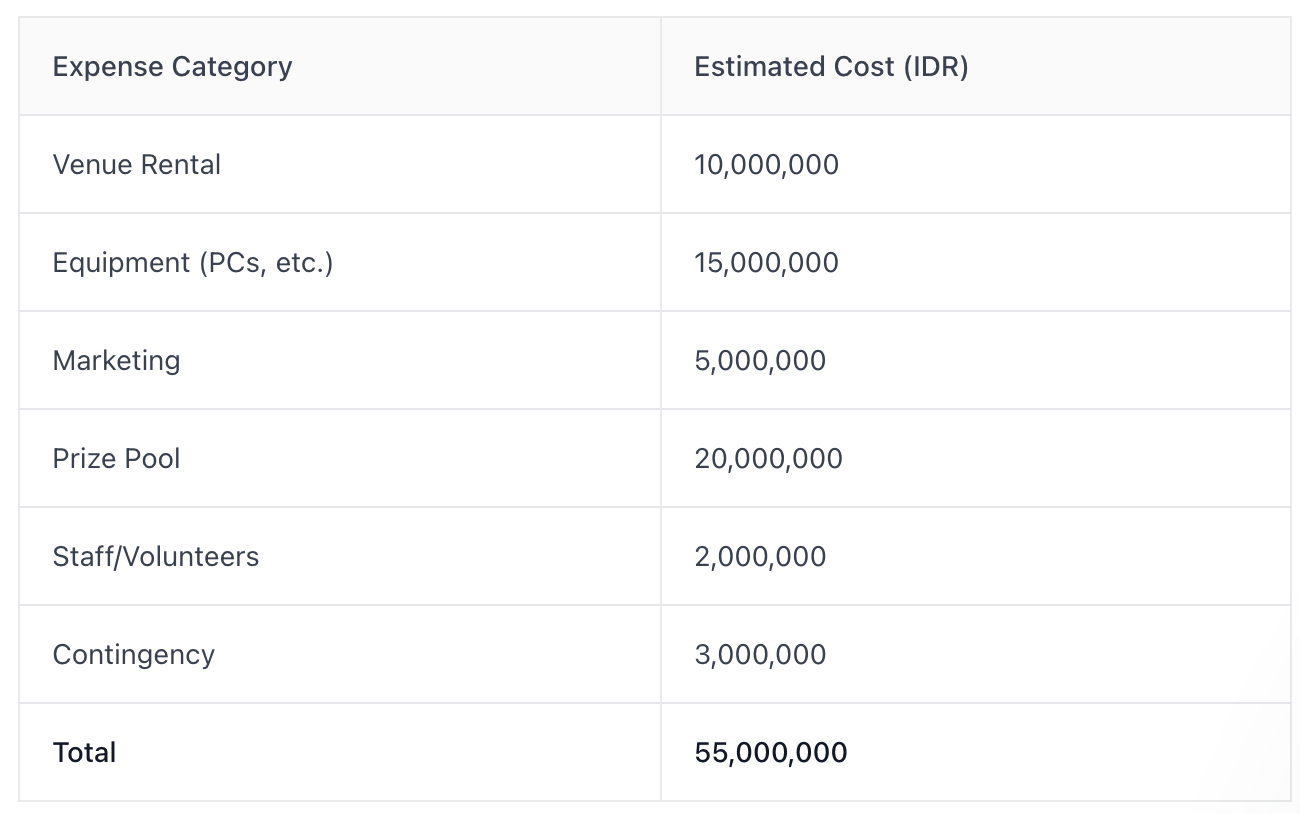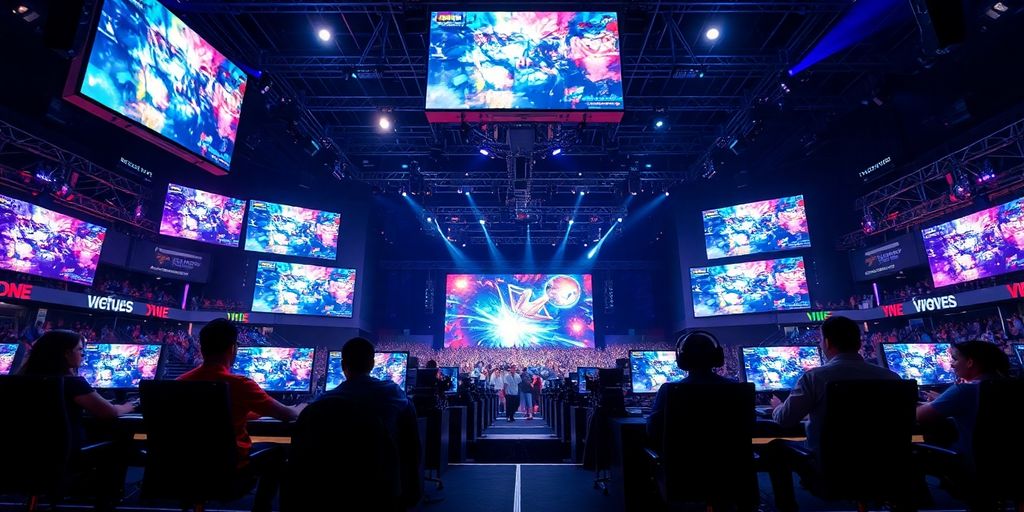Register as an organizer
Click the button below and finish your organizer registration, or fill out the form and we will be in touch to assist you.
.jpeg)
So you're thinking about putting on a Mobile Legends tournament in Indonesia? That's a big project. The gaming community there is massive, and it seems like almost everyone plays. But organizing a successful event involves more than just finding a few teams to compete. A lot of work happens that people don't see. This article will go over the fundamentals of Mobile Legends tournament planning, focusing on what organizers in Indonesia really need to know. We'll touch on everything from getting the right paperwork to making sure the players and audience have a good experience.
So, you want to run a Mobile Legends tournament in Indonesia? Awesome! But before you even think about flashy graphics or shoutcasters, you need a solid foundation. This is where you figure out the who, what, where, when, and why of your event. Get this right, and everything else will fall into place much easier.
First things first: what do you want to achieve? Is it about growing the local Mobile Legends scene, raising money for charity, or just having a fun community event? Your goals will shape every decision you make. Think about who you're trying to reach. Are you targeting casual players, aspiring pros, or a mix of both? Knowing your audience helps you tailor the tournament experience to their needs and expectations. For example, a tournament aimed at casual players might focus on fun and inclusivity, while one for aspiring pros might prioritize competitive integrity and high stakes. Consider these points:
Let's talk money. Tournaments cost money, plain and simple. You need to figure out how much you'll need and where it's coming from. Create a detailed budget that covers everything from venue rental and equipment to marketing and prize pools. Don't forget to factor in unexpected expenses! A good financial plan also includes a strategy for generating revenue, whether through sponsorships, ticket sales, or merchandise. Here's a basic budget breakdown:

The tournament format determines how teams compete and advance. Common formats include single elimination, double elimination, and round robin. Each has its pros and cons, so choose one that fits your goals and the number of participating teams. You also need a clear and comprehensive rule set to ensure fair play and prevent disputes. This should cover everything from player eligibility and match procedures to code of conduct and penalties. Make sure the rules are easily accessible and understandable to all participants. Consider the tournament formats available and which best suits your needs.
A well-defined format and rule set are essential for a smooth and enjoyable tournament experience. It sets the stage for fair competition and minimizes potential conflicts, allowing players to focus on the game.
It's easy to get caught up in the excitement of planning a Mobile Legends tournament, but don't forget the less glamorous, but super important stuff: the legal side. Indonesia has its own set of rules, and you need to play by them to avoid problems down the road. Think of it as leveling up your event's security.
First things first, you gotta get your paperwork in order. This means figuring out what permits and licenses you need to actually run your tournament. It's not a one-size-fits-all thing; it depends on the size of your event, where you're holding it, and what kind of activities you're planning.
Here's a quick checklist to get you started:
Ignoring these steps can lead to hefty fines or even getting your event shut down. It's better to be safe than sorry. Do your research, talk to local authorities, and get all the necessary approvals before you start promoting your tournament.
Mobile Legends isn't your game; it belongs to Moonton. That means you can't just use their game without permission. You need to understand their intellectual property (IP) rights and get the necessary licenses or agreements to use their game in your tournament. This includes things like the game logo, characters, and in-game assets.
Here's what you need to consider:
Indonesia has rules about what you can and can't show or say in your broadcasts and advertisements. This includes things like age restrictions, content guidelines, and advertising standards. You need to make sure your tournament's broadcasts and ads comply with these rules to avoid legal trouble.
Keep these points in mind:
It might seem like a lot, but getting the legal stuff right is key to running a successful and sustainable Mobile Legends tournament in Indonesia. Don't skip this step!
Indonesia's Mobile Legends community is HUGE, and tapping into that passion is key for a successful tournament. It's not just about having a game; it's about creating an experience that resonates with players and keeps them coming back for more. Think about what makes Indonesian gamers tick – what are their expectations, what kind of engagement do they crave, and how can you deliver that?
Let's be real, nobody likes a clunky registration process. Make it easy for players to sign up! A smooth, user-friendly system is the first impression you make, and you want it to be a good one. Think mobile-first, since most Indonesian gamers are on their phones. Consider integrating with popular local payment gateways for registration fees. Also, make sure the system can handle the expected volume of registrations without crashing. A well-designed registration system can make or break your tournament before it even begins.
Ambiguity is the enemy. Clear, concise communication is vital. Don't leave anything open to interpretation. Provide detailed rulebooks in Bahasa Indonesia, and make sure schedules are easily accessible. Use multiple channels – social media, email, even WhatsApp groups – to keep teams informed. Consider creating a FAQ section to address common questions. A little extra effort in communication can prevent a lot of headaches later on. It's also important to have dedicated channels for teams to ask questions and receive timely responses. This shows that you value their participation and are committed to fair play.
Treat your players like VIPs. They are the heart of your tournament. Have a dedicated team to handle player inquiries and provide on-site support. This includes everything from helping with technical issues to addressing concerns about scheduling or rule interpretations. Create a comfortable and welcoming environment for players. Provide amenities like water, snacks, and comfortable seating. Remember, happy players are more likely to participate in future tournaments and spread positive word-of-mouth. Building a strong [esport community] is essential for long-term success.
A positive player experience translates directly into increased viewership, sponsorship opportunities, and overall tournament success. It's an investment that pays dividends in the long run.
It's time to get the word out! You've got a great tournament planned, but nobody will know about it if you don't market it effectively. This is where you make sure all your hard work pays off by attracting a huge audience. A well-executed marketing strategy is the key to a successful tournament.
Social media is your best friend. Platforms like Instagram, TikTok, and YouTube are where Indonesian gamers spend their time. Use them! Run targeted ads, create engaging content, and most importantly, partner with local gaming influencers. These influencers have built-in audiences that trust their opinions. A shout-out or sponsored stream from a popular influencer can do wonders for your tournament's visibility. Think about running contests or giveaways to boost engagement. It's all about getting people talking and excited about your event. For example, you could partner with an influencer to promote MLBB Mid-Season Cup.
Don't wait until the last minute to start marketing. Build hype weeks or even months in advance. Create a series of content pieces that tease the tournament, introduce the teams, and highlight key players. Develop storylines around rivalries or underdog stories. People love drama! Behind-the-scenes videos, player interviews, and highlight reels can all generate buzz. Consider a countdown timer on your website and social media to create anticipation. The more you can get people invested in the narrative, the more likely they are to tune in.
Tap into existing communities. Indonesia has a vibrant Mobile Legends community, with numerous online groups, forums, and fan pages. Reach out to these groups and offer them exclusive content, discounts, or opportunities to participate in the tournament. Partner with local gaming cafes or esports centers to host viewing parties or pre-tournament events. By working with these established communities, you can reach a wider audience and build a loyal following for your tournament. Remember, these fans are the lifeblood of the esports scene, so treat them well.
Word-of-mouth marketing is still incredibly powerful. Encourage players and fans to share their experiences and spread the word about your tournament. A positive online reputation can go a long way in attracting new viewers and participants.

This is where all the planning comes to life! You've got your players, your venue (or virtual space), and now it's time to show the world what you've created. A great broadcast can make or break a tournament, so it's worth investing in. Think of it as the face of your event – it's what most people will see and remember.
First, the venue. Is it a roaring stadium, or a cozy studio? Either way, it needs to support the tech. Consider things like power, internet bandwidth, and space for players and crew. For online events, think about server stability and platform capabilities. You don't want lag ruining the final match! Here's a quick checklist:
Next, the team. You need people who know what they're doing. Casters who can hype up the crowd, a director who can switch between cameras smoothly, and tech people who can fix problems on the fly. A good team can make even a simple game exciting. Don't underestimate the importance of experienced esport event management. Here's a breakdown of key roles:
Finally, the stream itself. Make sure it's stable, high-quality, and easy to access. Test everything beforehand, and have backup plans in case something goes wrong. Consider using multiple platforms to reach a wider audience. Think about virtual event platforms to enhance the viewing experience. A few tips:
A smooth, professional broadcast is key to a successful tournament. It not only enhances the viewing experience but also reflects positively on your brand and attracts sponsors. Don't cut corners here – invest in quality equipment and experienced personnel.

To get sponsors, you need to make packages that sound good to them. Think about what brands want: visibility, reaching a certain audience, and a good image. A basic package might include logo placement on banners and during the broadcast. A better package could add social media shout-outs, product placement during the event, or even naming rights for a specific segment. The key is to show sponsors how your tournament can help them reach their goals. Consider offering different tiers, like bronze, silver, and gold, each with increasing benefits and price points. Make sure to tailor some packages to specific sponsors; a one-size-fits-all approach rarely works. Think about what makes your event unique and how a sponsor can benefit from that.
It's not enough to just slap a logo on everything. Sponsors need to feel like they're part of the event, not just an advertisement. Find ways to weave them into the experience naturally. Maybe a sponsor's product can be used as a prize, or they can host a fun activity at the venue. The goal is to make the sponsorship feel organic and not forced. Think about how the sponsor's brand aligns with the gaming community and the tournament's vibe. If it feels like a good fit, it will be more effective. If it feels like a cash grab, it will turn people off. Remember, authenticity is key.
Don't rely solely on sponsors. There are other ways to make money from your tournament. Ticket sales are an obvious one, but think about different ticket types: general admission, VIP, backstage passes. Merchandise can also be a good source of revenue. Sell t-shirts, hats, and other items with the tournament logo or team logos. Online streaming subscriptions can provide a steady income stream. Offer exclusive content or ad-free viewing for subscribers. You could even run smaller, side tournaments with entry fees. The more revenue streams you have, the less dependent you are on any single source. Consider these options:
Finding the right balance between sponsorships and other revenue streams is important. You don't want to oversaturate the event with ads, but you also need to make sure you're covering your costs and making a profit. It's a constant balancing act.
Getting feedback after the tournament is done is super important. It's how you figure out what worked and what didn't. You need to hear from everyone involved: the players, the staff who helped run things, and the viewers who tuned in. This feedback loop is essential for making your next event even better.
Here's how to gather that feedback:
Numbers don't lie. Looking at the data from your tournament can give you a clear picture of its success. This means digging into things like how many people watched, how many tickets you sold, and how much money you made. It's about measuring the success of the event.
Here are some key metrics to track:
Here's an example of how you might present this data:

All the feedback and data in the world won't help if you don't actually use it. Take what you've learned and apply it to your next tournament. This is how you grow and improve over time. Don't be afraid to make changes and try new things. Think about the esport event management process.
The most important thing is to learn from your mistakes. Every tournament is a learning opportunity. By taking the time to evaluate your event, you can make sure that your next one is even better. This is how you build a successful and sustainable tournament series.
Alright, so planning a Mobile Legends tournament in Indonesia is a big job. It’s not just about getting some teams together. You have to really think about the local players, what they like, and how to reach them. Then there's all the official stuff, like permits and rules, which you can't ignore. And of course, making sure the internet and equipment don't fail on game day is a huge deal. It can be tough, especially with some of the challenges Indonesia faces. But the gaming community here is massive and full of energy. If you pay attention to the details and put in the work, you can create a tournament that people will be talking about for a long time.
Before you do anything else, figure out your main goal. Are you creating a fun tournament for your local community, or are you hoping to discover future pro players? Your goal determines who your audience is. Once you know that, you must create a budget. Planning your money carefully from the very beginning is a critical step that will save you from major headaches down the road.
Yes, you definitely do. To host a public event in Indonesia, you have to follow local regulations and get the necessary permits. It's also very important to respect the rules set by the game's publisher, Moonton. Always check their guidelines for community tournaments to make sure you have permission and are not breaking any rules.
Spreading the word effectively is the key. Use the social media channels where Indonesian gamers spend their time, like Instagram, Facebook, and TikTok. You can also team up with local gaming personalities or influencers to help promote your event. Make sure your registration process is very easy to use. Be clear about the rules, schedule, and prizes to get people excited to join.
It's possible, even for smaller events. You don't have to aim for huge national brands right away. Think about local businesses that want to reach young customers, like a neighborhood cafe, a tech store, or a snack company. Create simple sponsorship options that clearly show them the benefits, like putting their logo on the live stream or getting shoutouts from the announcers.
There is no single best format; it really depends on your goals and schedule. A single-elimination bracket is fast, but teams are out after just one loss. A double-elimination format is often more popular because it gives teams a second chance to fight their way back. For a longer event, you could have a group stage followed by a final playoff bracket. Choose what works best for your number of teams and timeline.
Not yet! The work you do after the event is what separates good organizers from great ones. It's the perfect time to gather feedback. Ask the players, your staff, and even the viewers what they liked and what could be improved. You should also analyze your viewership numbers to see which matches were the most popular. Using all this information will help you make your next tournament even better.
More blogs
Click the button below and finish your organizer registration, or fill out the form and we will be in touch to assist you.